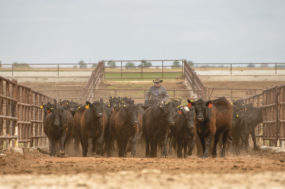Finding the best land and finding and maintaining the best animals requires hard work.
What should our adage be about employees? Research is very clear that once again the best employees are the most productive and contribute the most to business productivity and profitability. Similarly, finding and retaining great employees is hard work.
“I can’t find good help!”
This is an exclamation I hear all too often from farm managers, including beef producers. I recognize that hiring is difficult and often frustrating.
Before talking directly about hiring, let’s introduce a contrast I thought of recently.
In the 30 years I have worked with beef producers, I have never heard a beef producer exclaim: “I can’t produce beef.”
It certainly is not because producing beef is easy; you and I recognize the difficulties. Then why? Beef producers raise cattle because it is their job; they work every day in planning and producing beef.
Similarly, hiring is an integral part of your position as a beef production business owner, leader and manager. Those who succeed at hiring great employees have a hiring plan.
They work at it year-round. Successful hiring also makes producing crops and beef easier.
Good procedures for choosing machinery and developing a recruitment plan have more similarities than you might think. Consider the purchase of a new tractor.
You begin by specifying what you need – horsepower, features, etc. – given the tractors you already have and the characteristics of your farm.
You then collect information and compile – formally or informally – a list of possible makes and models that you might purchase. Finally, you collect detailed information – including cost – and select a tractor for purchase.
The hiring of the best people utilizes a similar procedure with two major differences. First, the choices are more important, as there are greater productivity differences among people than among different brands and models of machinery. Second, each manager is essentially on his or her own when hiring employees.
Begin your recruitment by identifying what you are looking for. We have all heard the adage: “If you don’t know where you are going, any road will get you there.”
The direct recruiting analogy of: “If you don’t know what you are looking for, any candidate will meet the job requirements” is a bit strong.
However, the probability of successfully choosing the correct candidate is greatly enhanced by knowing exactly what you are looking for.
Knowing what you are looking for begins with a job description. Then use the job description to carefully identify and articulate the three to five most important “competencies” to succeed in the position.
Competencies are the skills, knowledge, experience, performance behaviors and personal attributes required to succeed in this position.
The following is an example competency set for a feeder position:
- Successful experience doing repetitive tasks
- A penchant for precision
- Positive work attitude
- Reliability
The goal of recruiting is to reach and persuade a large number of qualified candidates to apply for the open position.
Recruiting includes promoting the positive attributes of the beef production business and the available position, and providing information about what will enable a potential candidate to succeed in the position: the competencies.
The positive attributes are sadly lacking in most recruitment materials I read. Recently, I was teaching a seminar for managers.
They had a very difficult time moving past their concern that they could not offer a competitive wage. Compensation is important but not nearly as important as most think.
Did you become a beef producer for the money? Take the time to brainstorm positives.
Your recruitment plan to reach great candidates and entice them to apply for your position can include informal word-of-mouth communications, want ads, job announcements, Internet job announcement and formal job services.
The following want ad for the feeder position – same ideas could be used in other recruitment forms – incorporates the competencies defined above for this position:
EXCELLENCE, TRAINING, TEAM ATMOSPHERE!!!! We are seeking reliable workers with a penchant for precision to feed our beef herd. Top of the Hill Ranch is a progressive family business.
We are committed to producing superior-quality beef for consumers and to providing outstanding job satisfaction for our employees.
The new employee will be responsible for all tasks required to feed our herd in a timely and professional manner. The position requires calm treatment of the animals and precision in the feeding process.
We provide initial training and continuing training. Weekday and weekend regular hours are available. Are you looking for a change? Apply to help serve consumers like you!! Applications available at:
Great marketing materials can be developed using the following seven steps:
- Lead with a positive statement or job characteristic that attracts attention.
- Give the job title.
- Say something positive about the business.
- Describe the job.
- Explain qualifications necessary for success in the position.
- Provide information on wages and benefits, as appropriate.
- Say how to apply for the job.
Selection involves choosing from the pool of candidates the individual or individuals who best match the competencies needed to succeed in the position.
Remember that you are determining the “fit” of this candidate for the position and promoting the position and your farm so the candidate is likely to accept should you decide to offer him or her the position.
The selection process involves many steps, typically the following:
- Review of resumes or application forms
- One or more employment interviews
- Testing, assessments and simulations
- Reference checks and recommendations
- Hiring
The heart of selection is the interview. Here are some ideas to ensure you are prepared for the interview:
- Recognize that an interview is an important, stressful event and that significant structure is needed.
- Construct a schedule for the interview.
- Make certain that the candidate fully understands in advance what to expect – anything he or she should bring or prepare, interview time (start and end), interview location, interview schedule and format, appropriate dress.
- Make certain the candidate knows exactly what to expect when he or she leaves the interview. What and when is the next step?
A prepared set of questions to be asked of all candidates is a unanimous recommendation by all interviewing experts and practitioners.
How do we write good interview questions? You should begin by writing a series of questions for each of the competencies.
Many of us have a tendency to ask questions that begin with “What would you do if … ?”
Research and interviewing experience has shown that a better question begins with “Tell me what you did the last time this happened … ?”
A concluding remark
Recently, I coached a manager (much like most reading this article) through the above procedures. He had previously essentially hired the first candidate.
I asked him how he felt after he hired an outstanding candidate. His answer was, “It was easier.” Although it seems difficult and time-consuming, hiring outstanding candidates produces rewards far greater than the cost. ![]()
Bob Milligan is also professor emeritus, Dyson School of Applied Economics and Management, Cornell University.

Bob Milligan
Senior Consultant
Dairy Strategies LLC








